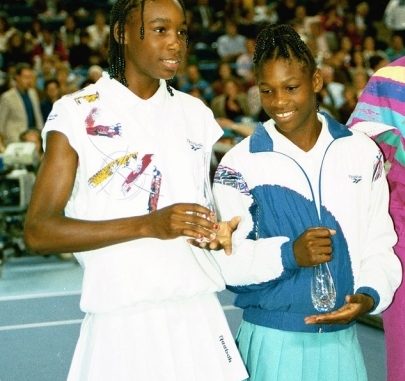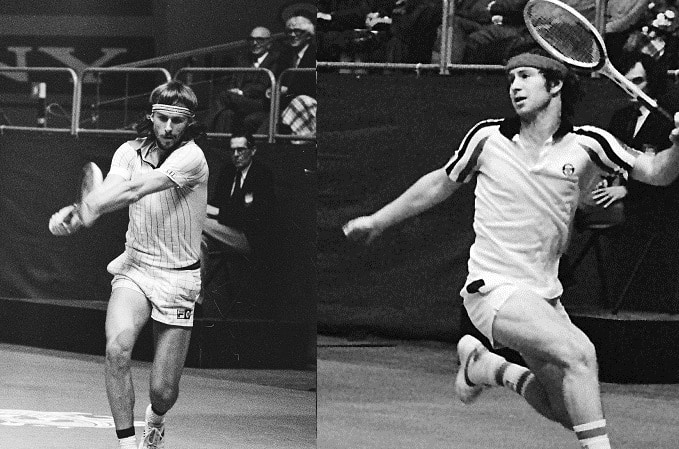
As the tennis world is at a halt, we take a moment to reflect over and appreciate six interesting, edgy rivalries that have made tennis history.
Venus Williams v Serena Williams
Let’s start with the most unusual one: this rivalry is special because, of course, the two players in question are related. Only one year and six victories separate the two sisters – the winning record held by Serena, 18 to 12.
She also leads in the ranking department, having ruled over the women’s tennis world at number 1 for a total of 316 weeks, compared to what seems in comparison a feeble 11 weeks for her older sister.
This rivalry is ridden with emotion: when Serena and Venus made their way into professional tennis, they were somewhat of a novelty. Tennis, until then, often came across as a white person’s sport.
[the_ad id=”14063″]
The All England Lawn Tennis Club takes the cake for emblemizing the upper-class etiquette associated with the sport, but in Miami, the story-lines weren’t that different.
David Law from the BBC comments:
“They were viewed in many corners as gatecrashers of the tennis world. It probably just highlights the structures in place – being a massively white world of privilege.”
The sisters’ rivalry was somewhat controversial back in those days because of suspicions of match-fixing too.
Famously coached from a very young age by their father Richard William, Serena and Venus elicited comments about the family calculating the results pattern.
Also Read:
- Thiem, Pliskova & Kvitova to Feature in Exhibition Tournaments
- Djokovic will Have to Abide by Rules: Nadal
Martina Hingis (then the world number one), when asked during the Miami Open if she thought Serena was finally ready to beat Venus, answered:
“Before that, it seemed like she wasn’t allowed to win.”
Rumors of matches being rigged flew in every direction, and Richard’s attitude in the players’ box did nothing to help the matter.
Understandably dizzy with pride, he could be seen holding up a white board at the beginning of the 1999 final that said:
“Welcome to the Williams show!”
A little while later, at the beginning of the second set, Venus was in the lead. Richard wrote another message on the board “Go Serena Go!”
This, of course, was received with some suspicion by both the audience and tennis pundits, who simply could not see a father wanting his two daughters to do well.
The sisters themselves have always expressed discomfort at the idea of playing each other.
In the HBO documentary Being Serena, the player says that whenever she beats Venus in a tournament, she feels like she owes it to her to win the whole thing. A very special kind of loyalty lay behind this one – a feeling that transcends matches and results.
When asked, back in 1999, if playing her sister too much could mean ruining their relationship, Serena answered:
“No, because tennis isn’t forever. Tennis is maybe for ten years.”
A statement that didn’t age well – as Serena still fights to beat Margaret Court’s record of 24 slams at the age of 38 – but which speaks volumes on this very special rivalry.

Björn Borg v John McEnroe
Perhaps the most famous rivalry in tennis is the Borg vs. McEnroe one. The bashful, hot-headed American against the controlled, silent Swede. The two played each other 14 times, and tie at 7 wins each, but the most emblematic match ever to be played between the pair is the famous Wimbledon final of 1980.
[the_ad id=”14063″]
The build-up to their first Grand Slam final was as important as the match itself: McEnroe was constantly asked about Borg, asked about how he would approach trying to upset the king of tennis. Borg was put under immense pressure to defend his title on the English grass for the fifth consecutive year; a very tough challenge for an already practically burnt-out tennis player.
The match is etched forever in Tennis History as an epic – won by Borg in five sets – with its incredible fourth-set tie break, concluding at 18-16 for McEnroe, after no less than 7 championship points saved by the American rising star.
Perhaps one of the most striking elements of this rivalry is how short-lived it was: after McEnroe finally managed to beat Borg in a Grand Slam final, a couple months later at the 1980 US Open, the Swede only had two years left before retiring, to everyone’s surprise, in January of 1983.
Also Read:
It’s often argued that, despite any rational thinking, the greats enjoy having a nemesis. They might not see it straight away, but it helps them improve, it keeps their fire burning, it keeps tennis alive. McEnroe and Borg are no exception to that rule: John begged and tried to convince Björn to return to the sport – to no avail.
Perhaps the two most contrasting players on court (in style and character) shared this one thing that keeps every player going: a passion for the sport.
Once Borg lost that passion at 26, perhaps due to too great a precocity (his first slam won at the prime age of 18), he did not find it in himself to keep making the same sacrifices that had made him a successful professional player.
“The worst thing happened: I no longer cared if I win or lost.”
McEnroe, who often yelled abuse to the chair umpire, was often pitted against the coolness of Borg, but, like for all these rivalries, the truth is more layered.
In the 2017 movie Borg McEnroe by Janus Metz, a line is spoken by Vitas Gerulaitis, a top player at the time:
“They say he’s an iceberg. Really he’s a volcano keeping it all in until boom.”
To be continued…
Be the first to comment